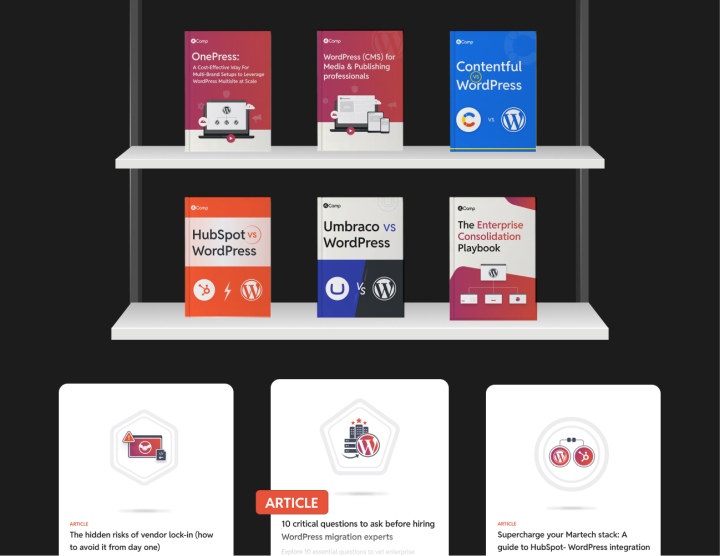Dealing with security posture and compliance management
While many mid-tier or high-end hosting options offer good infrastructure (quality servers, managed environments, even cloud-based scaling), when it comes to enterprise security and compliance, they stop at the infrastructure layer.
The enterprise is left bridging the gap between raw infrastructure certifications (AWS, Azure, GCP) and what actually happens in WordPress.
Enterprise WordPress hosting, on the other hand, extends protections, monitoring, and compliance practices directly into the WordPress application stack, where it’s really easy for you to build upon.
Proactive threat defense and mitigation
For enterprises, the attack surface is too broad, and the stakes are too high, so security can’t be left to point solutions. Enterprise WordPress hosting changes the model from “add-on security” to “security-ready infrastructure.”
Managed Web Application Firewall (WAF) configuration
Enterprise platforms deliver WAF-ready environments, with rules tuned for WordPress-specific attack vectors such as XML-RPC exploitation, SQL injection, and plugin-based vulnerabilities. Instead of enterprises building rules from scratch, they inherit hardened defaults and benefit from continuous updates.
DDoS mitigation at both network and application layers
Attacks don’t just overwhelm bandwidth but also choke application resources. Enterprise WordPress hosting integrates with global edge networks to filter traffic before it hits origin servers, while also managing application-level throttling to keep logged-in and transactional traffic safe. This dual defense is essential for ecommerce, portals, and high-volume publishing sites.
Zero-day response and continuous monitoring
Leading providers maintain dedicated security research and response teams who push patches or WAF rules within hours of emerging threats. Combined with 24/7 monitoring of traffic anomalies, failed logins, and suspicious queries, enterprises gain protection that’s proactive rather than reactive. Speed here is a key differentiator from mid-tier hosts relying solely on vendor patch cycles.
Proactive malware scanning and automated patch management
Vulnerabilities in plugins, themes, or the WordPress core can’t wait weeks for remediation. Enterprise-grade platforms continuously scan for malware, detect unauthorized file changes, and automatically patch OS and PHP dependencies, reducing exposure windows dramatically. While application-level plugin and theme updates remain an enterprise responsibility, hosting providers supply guidance and guardrails to keep overall environments clean.
Intrusion detection and behavioral analytics
Enterprise WordPress hosting platforms also employ intrusion detection systems (IDS) and behavioral monitoring to identify attacks that bypass traditional defenses. By flagging anomalies in traffic patterns, database queries, or user activity, these platforms provide early warnings and actionable intelligence before issues escalate.
Compliance and data governance essentials
Frameworks like SOC 2 Type II (controls around security and availability), ISO 27001 (global information security standard), and GDPR/CCPA (privacy regulations in the EU and California) impose strict requirements on how data is stored, accessed, and audited.
In regulated sectors, additional mandates such as HIPAA (healthcare data protection), PCI DSS (payment card security), or FedRAMP (U.S. government cloud compliance) may also apply. Meeting these requirements is the difference between winning enterprise customers and losing contracts.
Also, compliance isn’t just about passing an audit — it’s about maintaining customer trust, reducing risk, and ensuring the organization can operate in regulated markets without interruption.
Unlike standard hosting solutions, enterprise WordPress hosting doesn’t stop at infrastructure certifications but extends compliance-ready practices directly into the managed WordPress stack.
Key certifications
Enterprise providers often hold their own platform-level certifications, such as SOC 2 Type II and ISO 27001. These aren’t simply inherited from cloud vendors, but they validate how the hosting provider itself manages infrastructure, operations, and customer data. That includes processes like change management, monitoring, access control, and incident response. For organizations in regulated industries, some providers also offer scoped PCI DSS environments (for ecommerce payment workflows) or FedRAMP-ready deployments (for government contracts).
Encryption and key management
Compliance frameworks increasingly require proof that sensitive data is protected both in transit and at rest. Enterprise WordPress hosting platforms provide encryption by default (TLS/SSL for data in transit, AES-256 or similar for data at rest), along with secure key management practices. This ensures data is protected against interception, unauthorized access, and storage-level breaches, aligning with standards like GDPR, HIPAA, and SOC 2.
Contractual assurances
Compliance isn’t only about features, it’s also about accountability. Enterprise WordPress hosting providers can sign Data Processing Agreements (DPAs) for GDPR/CCPA or Business Associate Agreements (BAAs) for HIPAA. These contracts transfer legal responsibility in a way that standard or mid-tier providers typically cannot.
Data privacy and residency options
Enterprises operating globally need confidence in where data lives. Enterprise WordPress hosting providers offer regionalized data residency (e.g., EU, US, APAC), aligning with GDPR and HIPAA requirements. While complex multi-country segregation may require custom architecture, most enterprises can meet regional residency needs.
Industry-specific alignment
Where required, enterprise WordPress hosting can support specialized compliance demands (such as PCI DSS readiness for financial services or FedRAMP for government agencies or financial markets), making WordPress viable in industries where compliance barriers once ruled it out.
Access control and audit logging
Security doesn’t stop at the infrastructure layer. It extends into how teams actually work inside WordPress. For enterprises, the challenge isn’t just keeping attackers out, it’s ensuring internal users operate within tightly defined boundaries and that every action is traceable. Enterprise WordPress hosting strengthens this layer by combining granular access controls with audit-ready logging, giving organizations both prevention and accountability.
Role-based access control (RBAC)
Standard WordPress roles (Admin, Editor, Author, etc.) are often too basic for enterprise needs. Enterprise WordPress hosting supports granular, role-based access control, ensuring developers, content editors, and administrators only have the permissions they need. This minimizes insider risk and reduces the blast radius of misconfigurations or compromised accounts.
Single sign-on (SSO) integration
Identity management is central to enterprise security. With SSO integration, WordPress logins align with existing enterprise identity providers (e.g., Okta, Azure AD, Ping Identity). This enforces centralized policies (multi-factor authentication, password rotation, user provisioning/de-provisioning) across all enterprise systems, including WordPress. The result: less friction for users, greater consistency for IT security teams.
Comprehensive audit logs for security reviews and forensics
Compliance frameworks like SOC 2, ISO 27001, and HIPAA don’t just require strong access controls… they require proof. Enterprise WordPress hosting platforms provide immutable, tamper-resistant logs that record logins, role changes, content edits, and administrative actions. These logs are structured for audits, incident response, and forensic investigations, turning WordPress into a system that can stand up to regulatory scrutiny.
Evaluating Enterprise WordPress Hosting Security: From infrastructure to the application layer
Security posture and compliance management can’t be solved by infrastructure alone. Enterprises need hosting partners who understand the WordPress application layer as deeply as they understand the cloud infrastructure layer.
That’s what sets enterprise WordPress hosting apart. Platforms like WordPress VIP hosting and other managed WordPress hosting for enterprise solutions bridge the “last mile” between general cloud certifications and WordPress-specific security. They provide proactive defense, compliance-aligned environments, and application-layer guardrails that enterprises can build upon with confidence.
At enterprise scale, hosting isn’t just a technical choice, it’s also a governance engine. And choosing the best enterprise WordPress hosting means choosing a platform that keeps your business secure, audit-ready, and trusted in the eyes of your customers.







